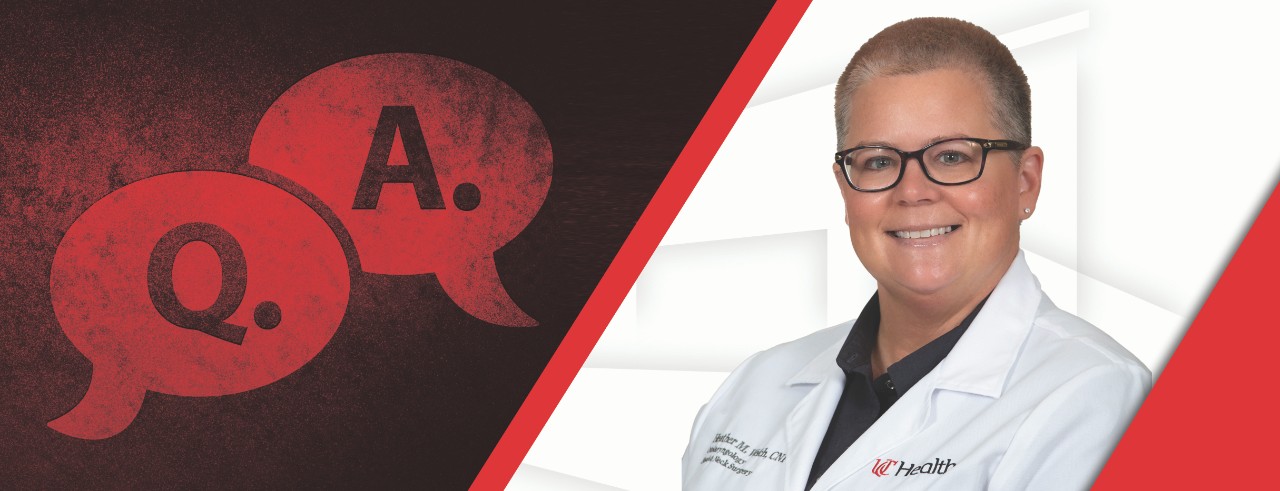
Q and A: Heather Welch, AGPCNP in Ear, Nose & Throat
Welch discusses why she chose to become an Adult-Gero Primary Care Nurse Practitioner and her role
Heather Welch is an Adult-Gero Primary Care Nurse Practitioner, which allows her to manage care for patients 13 and older. She specializes in difficult airway management for the Ear, Nose and Throat (ENT) program at UC Health. We asked Welch about why she chose to become an Adult-Gero Primary Care Nurse Practitioner, her current role and what she likes about it.
What was your career path before becoming an Adult-Gero Primary Care Nurse Practitioner?
I started as a licensed vocational nurse and worked my way up through each degree. I worked mostly in the emergency department and surgical intensive care unit. I also did some medical malpractice defense work as an RN.
Why did you decide to become an Adult-Gero Primary Care Nurse Practitioner?
I'm comfortable with adults; children scare me. I have worked my entire career with adults, so that is where I'm comfortable.
How did UC's Adult-Gero Primary Care Nurse Practitioner program prepare you for your career?
I was very well prepared. The classes are thorough and the professors are very knowledgeable. They are also very approachable. I felt supported.
What are your responsibilities as an Adult-Gero Primary Care Nurse Practitioner?
I am the airway nurse practitioner for Ear, Nose and Throat at UC Health/UC Physicians for Otolaryngology. I see complex airway patients — stenosis, tracheomalacia, etc. — in clinic and in inpatient settings. I do trach changes, flexible tracheobronchoscopy and video laryngoscopy, and manage medications related to the patient's condition. I also perform a few minor procedures, such as chemical cautery.
What have been some of the most rewarding and most challenging aspects of working as an Adult-Gero Primary Care Nurse Practitioner?
The biggest challenge I faced was switching from nurse mode to provider mode. Although you're still focusing on total patient care, you're placing the orders instead of performing the orders. At first, this was a challenging balance. I would have to say one of the most rewarding aspects is the relationships I develop with my patients. As a nurse, you see them either in clinic or in the hospital. As a provider, I am with them through all aspects of care for their disease process.
More Information
Learn more about UC's Adult-Gero Primary Care Nurse Practitioner online programs:
Tags
Related Stories
UC lab-on-a-chip devices take public health into home
May 8, 2025
University of Cincinnati engineers created a new device to help doctors diagnose depression and anxiety. The “lab-on-a-chip” device measures the stress hormone cortisol from a patient’s saliva. Knowing if a patient has elevated stress hormones can provide useful diagnostic information even if patients do not report feelings of anxiety, stress or depression in a standard mental health questionnaire.
Study explores social media’s growing influence on cosmeceutical...
May 7, 2025
The University of Cincinnati's Kelly Dobos spoke with Cosmetics Design USA about new research that revealed a significant rise in consumer interest in cosmeceuticals, or cosmetic products with active ingredients purported to have medical benefits.
UC students destigmatize stress in nursing
May 7, 2025
UC nurse anesthesia graduate students lead a research-based effort to address stress and burnout in nursing, coping strategies, and the importance of mindfulness and peer support.